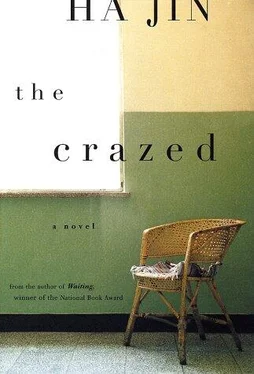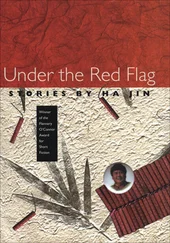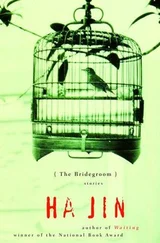How did Ying Peng collude with Vice Principal Huang in this case? No doubt she’d been helping his son all along. She assigned me to tend Mr. Yang every afternoon in order to distract me from preparing for the exams. She dispatched me to the countryside with a view to wasting my time, too. Now I realized why she had been so delighted when I told her that I would withdraw my application for the Ph.D. program. She had been an accomplice of Vice Principal Huang all the while, and her task was to prevent me from passing the exams so that I couldn’t join Meimei in Beijing.
Ever since the death of Mr. Yang, I had been wondering who were his enemies — those to be killed in his last wish. Now clearly Vice Principal Huang was one of them too.
Sitting in the deepening twilight, I felt like a small insect snared in a spiderweb. The harder I struggled, the tighter the strong, entwining filaments would enfold me, choking the life out of me little by little. Then came to mind the image of the dark, rubber-surfaced room described by Mr. Yang. I too felt trapped in such an indestructible cocoon, although I hadn’t despaired of escape yet.
When I returned to the dormitory, Mantao declared, “I’m going to Beijing tomorrow morning with some undergrads to demonstrate in Tiananmen Square.”
“He’s going to join the revolution,” Huran said to me. I made no comment.
“Do you want to come with us?” Mantao asked him.
“No way, not even for a thousand yuan,” replied Huran. “I’m going to marry next month.” He was joking. He didn’t have a girlfriend yet.
“How about you, Jian?” Mantao asked.
“My wallet is empty and I can’t pay for the train fare.” I told him the truth.
“No problem, I can give you fifty yuan. Look, I have money.” He pulled out a wad of banknotes from his pants pocket. Somebody must have given him the cash for the trip, because he was poorer than the other graduate students and often scrimped on food. Each month he would mail twentyfive yuan, almost half of his stipend, to his younger sister, who went to college in Wuhan City.
“My, he’s so generous today. What a philanthropist,” Huran put in.
Mantao said, “We’ve decided to join the struggle in Beijing. If we don’t take part now, there’ll be no hope for China anymore.”
“I’ll go with you,” I said.
“Are you kidding?” Huran asked me.
“No.”
“What made you interested in politics all of a sudden?” he kept on.
“It’s too stuffy here, and I want to get some fresh air in Beijing.”
“You may take in the smoke of gunpowder instead.”
“Fine with me.”
Mantao said with genuine emotion, “Jian, you’re my friend, a real man!” He handed me a Tsingtao beer, which I downed in two swallows. Again a film veiled my eyes; I felt like sobbing, but restrained myself. Meantime Huran drank his beer silently, amazed by my outward insouciance.
That’s how I decided to go to Beijing with Mantao and thirty-two undergraduates. Different from them, I had no grand purpose or dream of democracy and freedom; nor did I have the sense of responding to our national exigencies. My motive was mainly personal — I was driven by desperation, anger, madness, and stupidity. First, I meant to show Meimei that I was not a coward and could go to the capital at any time and in any way I chose. Second, I wanted to puncture a hole in this indestructible cocoon that caged me; somehow I felt that the right place to plunge a knife in was Beijing — the sick heart of this country. I was crazed, unable to think logically, and was possessed by an intense desire to prove that I was a man capable of action and choice. So I set out for the capital with a feverish head.
On the morning of June 3 we boarded the 5:30 train bound for Beijing. Through a light fog, the eastern sky was just turning pale. Two teachers saw us off at the platform. One was Kailing and the other a lecturer in physical education, our school’s soccer coach, whose son was among us. Kailing was wearing sunglasses and a windbreaker. With a secretive air she whispered something to Mantao near the iron paling, about twenty yards away from us. Then she handed him a folded envelope, which I suspected contained cash. It was said that she had made quite a bit of money by translating modern German fiction, and that unlike most poor teachers, she hired a maid for cooking and housework. Ever since Mr. Yang’s death, I had felt she was evasive whenever I ran into her, probably because she suspected I had my doubts about her relationship with him, which I was actually inclined to regard as mere friendship.
Both the teachers said good-bye to us when the train started. It pulled out smoothly as if wafted away by dozens of hands waving along the platform.
Soon after we settled down in our seats, Mantao and I were elected the leaders of the group, because we two were the only graduate students among them. The undergraduates assumed that Mantao and I, four or five years older than themselves, were more knowledgeable about political struggles. I was reluctant to accept any leadership, but after they repeatedly begged me, I yielded. I felt uncomfortable about my new role. Whenever one of them called me Vice Chief Wan, a sour taste would come to my mouth.
The train chugged along a muddy lake in the north, whose surface was mottled with green and dark patches of reeds. A flock of domestic geese, like white dots, were floating almost motionlessly in the distant water, brightened by the rising sun. After we passed the lake, the landscape suddenly seemed narrowed. The fog was thinning away, though the windowpanes of the train still sweated, blurring the endless peanut and wheat fields divided by rows of stunted mulberry trees. A baby burst out crying at the front end of the car; however hard its mother tried to calm it down, it wouldn’t stop. The baby’s hollering, mixed with the soft Taiwanese music and the pungent tobacco smell, made my head swim a little. The floor was littered with pumpkinseed shells, candy wrappers, popsicle cartons, chicken bones. Under our feet the wheels were grinding rhythmically but with such a clatter that when talking, we had to strain our voices. Since conversation was hard, we remained silent most of the time except that once in a while we’d curse the government together. Many of the undergraduates had somber faces as though they had grown older all at once.
A spindly attendant in a blue, visored cap appeared, carrying a large kettle, and seat by seat he poured boiled water for the passengers. With a few exceptions, people all produced their mugs. Many of the undergraduates brewed black tea, which a boy had brought along. For breakfast, some of them broke instant noodles into their mugs to be soaked with hot water. The attendant knew we were going to Beijing to join the demonstrations, so he was very patient with us. Unlike them, I was too sleepy to bother about tea and food. It was getting hot, though overhead a miniature fan in a wire cage revolved without stopping. The soot-grimed window near me got stuck and couldn’t be lifted up to let in fresh air. I was bored by the news blared out by the loudspeaker. Eyes shut, I leaned against the window frame, my head pillowed on my forearm. Soon I fell asleep.
Approaching the capital in the evening, we began to make plans for our next step. We decided to raise our flag, which had SHANNING UNIVERSITY printed on it, and march to a bus stop. From there, we would get on a bus going to Tiananmen Square. We were not sure what bus route we should take; some said Number 20, some said Number 14, and some said Number 1. But this shouldn’t be a problem; we could always ask.
The train was two hours late, and we didn’t get off until eight in the evening. Once out of the station, we were told that there was no bus service for the time being, because all vehicles had gone to barricade the streets to stop the army from entering the city. Even the subway was closed — rumor had it that the military was using the trains to transport troops downtown through the underground tunnels. A skinny young woman in a railroad uniform gave us each a handbill that contained mimeoed slogans, such as Our motherland is in danger! This is our last struggle! Let us save the republic! Stop the army from entering the capital! End martial law! Down with the corrupt government! I had a foreboding something hideous was unfolding in the distance. It was whispered that the army was going to clear Tiananmen Square tonight.
Читать дальше

![Lao Zi - Dao De Jing [Tao Te Ching] (english)](/books/3890/lao-zi-dao-de-jing-tao-te-ching-english-thumb.webp)
![Lao Zi - Dao De Jing [Tao Te Ching] (chinese)](/books/3891/lao-zi-dao-de-jing-tao-te-ching-chinese-thumb.webp)
![Lao Zi - Dao De Jing [Tao Te Ching] (espanol)](/books/3892/lao-zi-dao-de-jing-tao-te-ching-espanol-thumb.webp)







